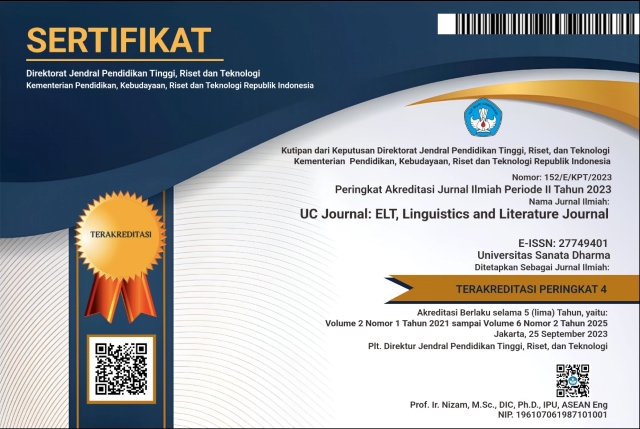FACTORS CONTRIBUTING TO STUDENTS DIFFICULTIES IN ACADEMIC WRITING CLASS: STUDENTS PERCEPTIONS
(1) Universitas Kristen Satya Wacana, Salitiga,
(2) Universitas Kristen Satya Wacana, Salitiga
(*) Corresponding Author
Abstract
Writing is one of the most difficult skills in learning English as a Second Language (ESL) or English Foreign Language (EFL). Many language learners encountered difficulties from the writing process. At the tertiary level, students are required to produce academic essays, which are difficult and may frustrate students. The purpose of this study was to analyze factors contributing to students difficulties in an Academic Writing course based on the students perceptions. This study used a qualitative method. The instruments used were open-ended questionnaires and interview protocol. In this study, all the participants answers were coded and analyzed descriptively. The participants were 22 students who were taking Academic Writing class for repeaters in Semester I, 2018/2019 academic year, in an English Language Education Program, in a university in Central Java, Indonesia. Questionnaire data were coded and classified by the researcher. In conducting the interview, data were audio-recorded and transcribed. Those data were analyzed to answer the research questions in this study. Based on the findings, there were two factors that caused students difficulties in writing academically. The two factors were internal and external. Internal factors consisted of self-motivation, self-confidence, lack of knowledge and feeling of under pressure. External factors consisted of the teachers teaching style, classroom atmosphere, materials, and writing aspects. This research hopefully can help teachers and instructors in developing appropriate teaching techniques in Academic Writing and minimize students' difficulties in Academic Writing.
Keywords
Full Text:
PDFReferences
Alves, A. R. (2008). Process Writing. Centre for English Language Studies, 1-24. Retrieved on November 21, 2019 from https://www.birmingham.ac.uk/Documents/college- artslaw/cels/essays/languageteaching/AReisAlvesProcessWritingLTM.pdf
Alfaki, I. M. (2015). University Students English Writing Problems: Diagnosis and Remedy. International Journal of English Language Teaching, 3(3), 40-52. Retrieved on October 18, 2018 from
http://www.eajournals.org/wp-content/uploads/University-Students----English-Writing-Problems- Diagnosis-and-Remedy.pdf
Awla, H.A (2014). Learning Styles and Their Relation to Teaching Styles. International Journal of Language and Linguistics, 2(3), 241-245. Retrieved on November 22, 2019 from
https://www.researchgate.net/publication/275567766_Learning_Styles_and_Their_Relation_to_T eaching_Styles
Cheng, Y. S. (2004). EFL Students Writing Anxiety: Sources and Implications. English Teaching & Learning. 41-62. Retrieved on November 7, 2018 from
https://www.researchgate.net/publication/306392321_EFL_Students'_Writing_Anxiety_Sources_ and_Implications
Fareed, M., Ashraf, A., & Bilal, M. (2016). ESL Learners Writing Skills: Problems, Factors, and Suggestions. Journal of Education and Social Sciences, 4(2), 81- 92. DOI: 10.20547/jess0421604201
Hyland, K. (2003). Second Language Writing. Cambridge University Press, 1-15. Retrieved on December 2, 2019 from http://catdir.loc.gov/catdir/samples/cam041/2003041957.pdf
Listyani. (2018). Enhancing Academic Writing Skills through Reading to Learn Strategy. Arab World English Journal, 9(1), 268-280. DOI: https://dx.doi.org/10.24093/awej/vol9no1.19
Listyani. (2018). Promoting Academic Writing Students Skill through Process Writing Strategy. Advances in Language and Literary Studies, 9(4), 173-179. DOI: http://dx.doi.org/10.7575/aiac.alls.v.9n.4p.173
MacIntyre, P. D. (1999). Language Anxiety: A Review of the Research for Language Teachers. In D. J. Young (Ed.), Affect in foreign language and second language learning: A practical guide to creating a low-anxiety classroom atmosphere, 24-45. Boston: McGraw-Hill.
Paker, T., & Erarslan, A. (2015) Attitudes of the Preparatory Class Students Towards the Writing Course and Their Attitude-Success Relationship in Writing. Journal of Language and Linguistic Studies, 11(2), 1-11. Retrieved on November 29, 2018 from
https://www.researchgate.net/publication/282814183_JOURNAL_OF_LANGUAGE_AND_LIN GUISTIC_STUDIES_Attitudes_of_the_preparatory_class_students_towards_the_writing_course _and_their_attitude-success_relationship_in_writing
Salglamel, H., & Kayaoglu, M.N. (2015). English Major Students Perceptions of Academic Writing: A Struggle Between Writing to Learn and Learning to Write. Journal of History Culture and Art Research, 4(3), 37-52. DOI: 10.7596/taksad.v4i3.477
Silva, T. (2006). Second Language Writing. Purdue University, West Lafayette, in USA, 111-118. DOI: 10.1016/B0-08-044854-2/00631-3
Shang, H. F. (2013). Factors Associated with English as a Foreign Language University Students Writing Anxiety. International Journal of English Language Teaching, 1(1), 1-12. Retrieved on October 31, 2018 from http://www.eajournals.org/wp- content/uploads/FACTORS-ASSOCIATED-WITH-ENGLISH-AS-A-FOREIGN-LANGUAGE- UNIVERSITY-STUDENTS%E2%80%99-WRITING-ANXIETY.pdf
Stawiarska, M. M. (2012). Foreign Language Writing Anxiety among Adult Advanced Learners of English. Linguistica Silesiana, 33, 221-239. Retrieved on October 23, 2018 from https://www.researchgate.net/publication/281718600_Foreign_language_writing_anxiety_among _adult_advanced_learners_of_English
Zamel, V. (1985). Responding to Student Writing. TESOL Quarterly, 19(1), 79-101. Retrieved on November 12, 2018 from https://onlinelibrary.wiley.com/doi/abs/10.2307/3586773
DOI: https://doi.org/10.24071/uc.v1i2.2966
Refbacks
- There are currently no refbacks.
Copyright (c) 2020 Algrenita Silvina Budjalemba, Listyani Listyani

This work is licensed under a Creative Commons Attribution-ShareAlike 4.0 International License.
UC Journal is indexed in:
UC Journal Sinta 4 Certificate (S4 = Level 4)
We would like to inform you that UC Journal: ELT, Linguistics and Literature Journal, or UC Journal has been nationally accredited Sinta 4 by the Ministry of Education, Culture, Research and Technology of the Republic of Indonesia based on the decree No. Surat Keputusan 152/E/KPT/2023. Validity for 5 years: Vol 2 No 1, 2021 till Vol 6 No 2, 2025
DOI: https://doi.org/10.24071/uc
e-ISSN (validity starting Vol 1, No 2, November 2020): 2774-9401

This work is licensed under CC BY-SA.
Creative Commons Attribution-ShareAlike 4.0 International License
 UC Journal: ELT, Linguistics and Literature Journal, a scientific peer-reviewed journal, was established in 20 May 2020 and is published twice a year, namely in May and November, by the English Language Education Study Programme (S1/Sarjana PBI) in collaboration with the English Education Master's Programme (S2/Magister PBI) of Sanata Dharma University, Yogyakarta, Indonesia.
UC Journal: ELT, Linguistics and Literature Journal, a scientific peer-reviewed journal, was established in 20 May 2020 and is published twice a year, namely in May and November, by the English Language Education Study Programme (S1/Sarjana PBI) in collaboration with the English Education Master's Programme (S2/Magister PBI) of Sanata Dharma University, Yogyakarta, Indonesia.















